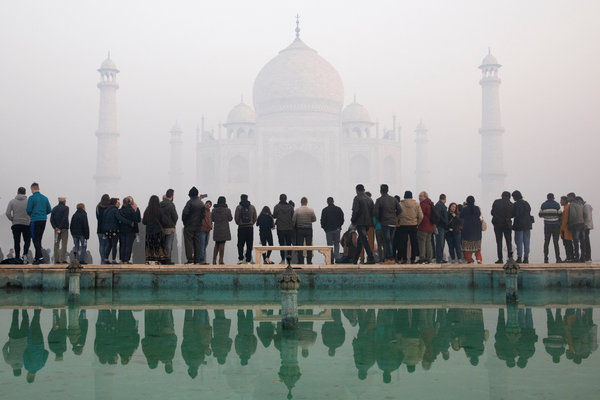When Yondje Choi was told she would need a face mask for an upcoming trip to South Korea, Ms. Choi, a 31-year-old New Yorker, was shocked.
“I knew air pollution is a major problem in Beijing, but I didn’t know it was this bad here,” she said last month in Seoul.
While China takes a bulk of the heat when it comes to unhealthy levels of air quality, air pollution is a major issue throughout Asia and beyond, even to Europe and North America. Without research and self-care, even short-term visitors may feel the effects. Here are some precautions you can take to help you breathe easier.
Look up the air quality before you go
You can find a given city’s Air Quality Index, or A.Q.I., on air-monitoring websites like aqicn.org. This index indicates how polluted or dirty the air is (typically measuring particulate matter in the air) and explains the possible health implications of that level. While A.Q.I. levels are often referenced to in the United States during allergy season or at times of dust storms or wildfires, the index is commonplace throughout Asia. The U.S. Department of Agriculture has a complete explanation of what makes “good” or “bad” air quality on its website.
When it comes to travel, researching air-quality websites can help inform where you want to go and when you want to be there. Heavily polluted cities have bad A.Q.I. measures all year, but some destinations have only a few months of daily, unhealthy air pollution. East Asian countries, for instance, are affected by Asian Dust (yellow dust particles carried on the wind from the Gobi Desert) in the spring, and many savvy travelers opt for visiting during the fall instead.
Learn face mask basics
A proper air-filtering face mask can be your best friend when air quality is low. Although you can find disposable face masks at pharmacies in most cities, the type of masks recommended by medical professionals are rarely found in drugstores or department stores. You’re better off ordering quality ones online in advance of your trip instead of scrambling to find them in a new city.
Not sure which kind to get? Based on her research on the effectiveness of face masks in Beijing, Dr. Miranda Loh at the Centre for Human Exposure Science in Edinburgh recommends looking for masks rated N95 (meaning the mask removes 95 percent of all particles in the air that are at least 0.3 microns in diameter or larger) or FFP3 (meaning the mask may only leak a maximum of 5 percent or air and it must filter 99 percent of all particles measuring up to 0.6 microns), both standards that indicate a high ability to filter out fine dust.
Of the masks she studied, Dr. Loh said she found 3M’s Aura Disposable Respirator 9322+ mask most effective at consistently reducing exposure to their study volunteers. In addition to buying a proper mask, she recommends limiting a mask’s use and wearing the mask strictly as its package instructs.
When you should wear your mask depends on your age and health, and there’s no strict guideline that everyone everywhere agrees on. In China, for instance, the government suggests wearing a mask when the A.Q.I. is over 200, but many people choose to wear one when the A.Q.I. is closer to 100 or 150. Your best bet is to look at the A.Q.I. on a given day, review the air quality scale, and judge for yourself. People with respiratory issues, allergies or asthma should be especially careful.
Love the skin you’re in
After a day of sightseeing, protecting your skin and your lungs from air pollution and particulates that may have settled in your clothes, on your skin or in your hair, is simple: take a shower as soon as you can, apply sunscreen and moisturizer, and repeat every time you spend a prolonged period outdoors.
Dr. Steven Wang, director of Dermatology at the Memorial Sloan Kettering Cancer Center of Basking Ridge, has studied the effects of ambient air pollution on skin. His top tips include applying sunscreen in the morning; using gentle, liquid cleansers; and generally making sure to take care of your skin when you travel.
Know when to just stay inside
Refraining from outdoor activities on heavily-polluted days is the most common piece of advice when it comes to avoiding the effects of air pollution from medical experts, including those at the American Lung Association. Plan activities like museum visits, souvenir shopping trips, and other mostly-indoor activities for days when the air quality is really bad. Or, just keep a few of those activities in your pocket in case everything seems good one day, but the air quality takes a turn on the next.
Fortunately for those looking for a reprieve from air pollution, a growing number of accommodations and activities are now making clean air a main feature. Not only have several hotel chains have added air purifiers to their list of amenities, but smog-free cinemas, oxygen bars and clean air cafes have become en vogue in cities like Seoul, Bangkok and Beijing. If you’ve already been to the museum, maybe it’s time to take in a film.
Hahna Yoon is a Seoul-based journalist who covers travel, food and culture. She has been published in Lonely Planet, Time Out Seoul and Monocle. Follow her on Twitter @hahnay.
52 PLACES AND MUCH, MUCH MORE Follow our 52 Places traveler, Sebastian Modak, on Instagram as he travels the world, and discover more Travel coverage by following us on Twitter and Facebook. And sign up for our Travel Dispatch newsletter: Each week you’ll receive tips on traveling smarter, stories on hot destinations and access to photos from all over the world.



